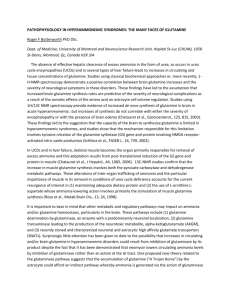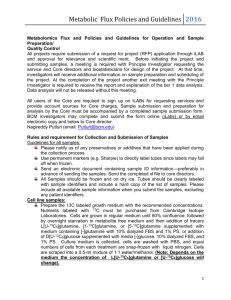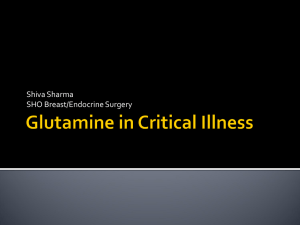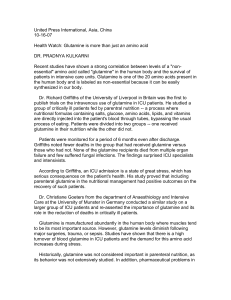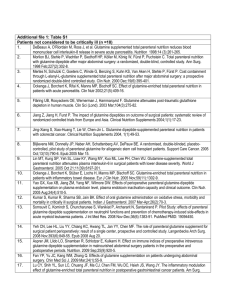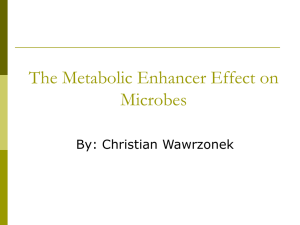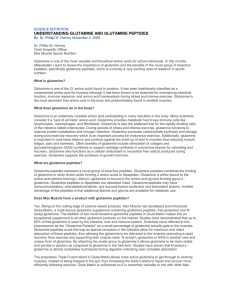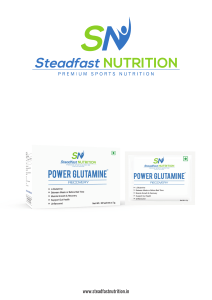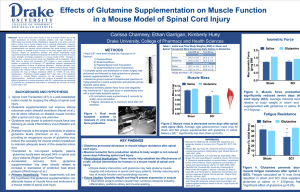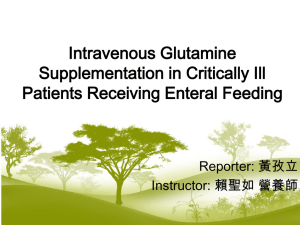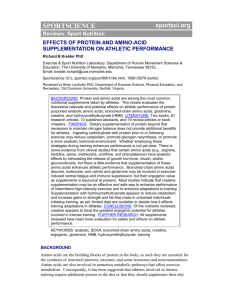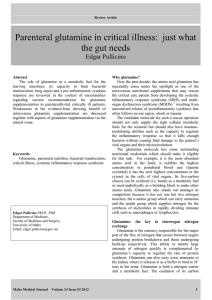Reprint - Sportscience
advertisement
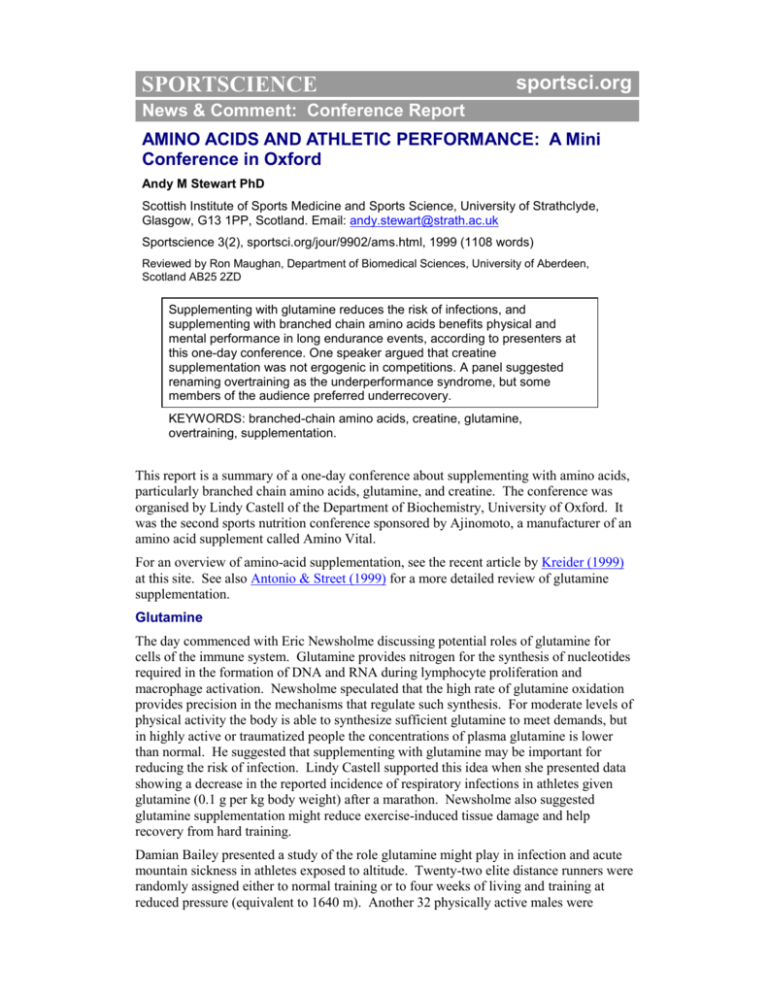
SPORTSCIENCE sportsci.org News & Comment: Conference Report AMINO ACIDS AND ATHLETIC PERFORMANCE: A Mini Conference in Oxford Andy M Stewart PhD Scottish Institute of Sports Medicine and Sports Science, University of Strathclyde, Glasgow, G13 1PP, Scotland. Email: andy.stewart@strath.ac.uk Sportscience 3(2), sportsci.org/jour/9902/ams.html, 1999 (1108 words) Reviewed by Ron Maughan, Department of Biomedical Sciences, University of Aberdeen, Scotland AB25 2ZD Supplementing with glutamine reduces the risk of infections, and supplementing with branched chain amino acids benefits physical and mental performance in long endurance events, according to presenters at this one-day conference. One speaker argued that creatine supplementation was not ergogenic in competitions. A panel suggested renaming overtraining as the underperformance syndrome, but some members of the audience preferred underrecovery. KEYWORDS: branched-chain amino acids, creatine, glutamine, overtraining, supplementation. This report is a summary of a one-day conference about supplementing with amino acids, particularly branched chain amino acids, glutamine, and creatine. The conference was organised by Lindy Castell of the Department of Biochemistry, University of Oxford. It was the second sports nutrition conference sponsored by Ajinomoto, a manufacturer of an amino acid supplement called Amino Vital. For an overview of amino-acid supplementation, see the recent article by Kreider (1999) at this site. See also Antonio & Street (1999) for a more detailed review of glutamine supplementation. Glutamine The day commenced with Eric Newsholme discussing potential roles of glutamine for cells of the immune system. Glutamine provides nitrogen for the synthesis of nucleotides required in the formation of DNA and RNA during lymphocyte proliferation and macrophage activation. Newsholme speculated that the high rate of glutamine oxidation provides precision in the mechanisms that regulate such synthesis. For moderate levels of physical activity the body is able to synthesize sufficient glutamine to meet demands, but in highly active or traumatized people the concentrations of plasma glutamine is lower than normal. He suggested that supplementing with glutamine may be important for reducing the risk of infection. Lindy Castell supported this idea when she presented data showing a decrease in the reported incidence of respiratory infections in athletes given glutamine (0.1 g per kg body weight) after a marathon. Newsholme also suggested glutamine supplementation might reduce exercise-induced tissue damage and help recovery from hard training. Damian Bailey presented a study of the role glutamine might play in infection and acute mountain sickness in athletes exposed to altitude. Twenty-two elite distance runners were randomly assigned either to normal training or to four weeks of living and training at reduced pressure (equivalent to 1640 m). Another 32 physically active males were randomly assigned in a double-blind manner either to normal training or to four weeks of intermittent laboratory-based training while they breathed nitrogen-enriched air equivalent to an altitude of 1640 m. Tests were conducted immediately pre and post intervention. The incidence, duration, and severity of infectious illnesses increased and plasma glutamine concentration decreased only in the athletes living and training at altitude. Greater decreases in plasma glutamine were evident in the elite athletes. In contrast, plasma glutamine increased after intermittent altitude training, whereas there were no changes following normal training. These results suggest that the duration of the hypoxic stimulus has important implications for an individual’s well-being during altitude exposure. Bailey also suggested that the greater the aerobic conditioning the greater the likelihood of infection at altitude, and that symptoms (headache, nausea, sleep disturbance, lethargy) of acute mountain sickness seem to be more prevalent in the more aerobically fit athletes. Preliminary results from a lab-based study suggest that the degree of arterial desaturation may be related to the incidence of acute mountain sickness. Branched-Chain Amino Acids Some researchers think that a fall in the plasma concentration of branched-chain amino acids (BCAAs) contributes to fatigue in endurance events (see Kreider's review for an explanation), but attempts to enhance endurance performance with BCAA supplementation have been inconclusive. Until now, that is. Eva Blomstrand presented results indicating a 3-4% enhancement in marathon performance following consumption of a sports drink (PRIPPS Energy-2) containing BCAAs. Blomstrand also showed evidence that cognitive ability at the conclusion of a 30-km cross-country run was improved or maintained following supplementation with the same drink. Suggestive but not strong evidence of long-term benefits of BCAA feeding on racehorses and rugby players was also presented. Creatine Jacques Poortmans gave the most controversial talk of the day, with a strong view that creatine supplementation does not work. He admitted that positive benefits were found in laboratory studies, but he suggested that any enhancements in performance observed in the field are due to higher motivation to perform in that environment than in a laboratory setting. He also spoke about the side effects of creatine supplementation. One of the side effects is a gain in body weight, which is actually a benefit if it represents a gain in mass of muscle protein. He claimed that an increase in body weight was evident in less than half of 29 studies he reviewed, but if he was counting only statistically significant changes in weight, it is possible that most studies showed gains. The extent to which water retention and protein synthesis contribute to the weight gain requires further research: watch for a paper by Francaux and Poortmans in the European Journal of Applied Physiology. Finally, in his view creatine supplementation does not cause harmful or unpleasant side effects, such as liver problems, muscle cramps, and gastrointestinal disorders. Overtraining, Underrecovery, or Underperformance? For the final act of the day, an invited panel discussed the overtraining syndrome, then suggested renaming it the underperformance syndrome. The panel objected to the term overtraining, because they didn't like the implied emphasis on too much training as the cause of not performing well. In the ensuing debate, some members of the audience agreed with the proposed new term, while others thought underrecovery was a better description. Do we need a term to encompass poor performance due to factors other than training stress? Yes, in my opinion, but only if there is good evidence that these factors all cause poor performance in the same way. Will we want to replace overtraining with this term? Not if we want to talk about poor performance due to too much training. Whether underrecovery is a better way to describe such poor performance and whether the term will catch on remains to be seen. Thanks to Lindy Castell for valuable comments during the preparation of this report. References Antonio J, Street C (1999). Glutamine: a potentially useful supplement for athletes. Canadian Journal of Applied Physiology 24, 1-14 Kreider RB (1999). Effects of protein and amino-acid supplementation on athletic performance. Sportscience 3(1), sportsci.org/jour/9901/rbk.html (5579 words) Edited by Will Hopkins. Webmastered by Will Hopkins. Published July 1999. ©1999
